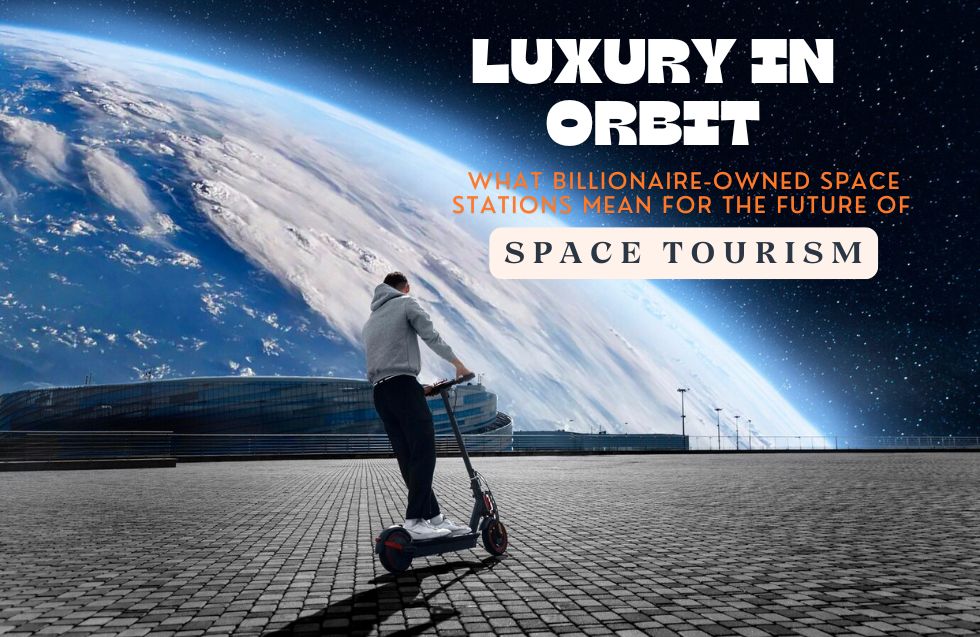The space tourism industry has leaped from sci-fi fantasy to reality, driven largely by billionaire entrepreneurs like Elon Musk, Jeff Bezos, and Richard Branson. However, what was once a brief suborbital experience is now evolving into something even more extraordinary—luxury space stations owned by the ultra-wealthy. These private space stations could redefine space tourism, setting the stage for an entirely new market segment: high-end, orbit-based travel.
The Rise of Billionaire-Owned Space Stations
Billionaires are pushing the boundaries of what is possible in space tourism. Companies like SpaceX, Blue Origin, and Axiom Space are not only making space travel more accessible but are also working toward creating sustainable living environments in space. Axiom Space, for example, plans to build the world’s first private space station, aiming to offer a luxurious experience for tourists, scientists, and commercial partners alike.
These space stations will feature state-of-the-art facilities designed for comfort and exclusivity, akin to luxury hotels. Imagine floating in zero gravity while enjoying gourmet meals, stunning views of Earth, and the finest amenities—experiences that would only be available to the elite, for now.
Space Tourism as a Lucrative Business
The development of luxury space stations signifies a monumental business shift in space tourism. Space stations will no longer be government-controlled facilities solely for research and science; they are becoming private assets, subject to market demands. The commercialization of space travel opens up lucrative opportunities for several industries, from hospitality and real estate to technology and entertainment.
Business Opportunities
- Hospitality and Space Hotels: Much like exclusive resorts on Earth, space hotels will cater to ultra-high-net-worth individuals seeking an extraordinary travel experience. The business model for space tourism will shift from short-term trips to long-term stays aboard luxurious space stations. Private firms that specialize in hospitality could collaborate with space companies to design suites, lounges, and fine-dining experiences tailored to wealthy travelers.
- Real Estate in Orbit: As space stations become a reality, space real estate could emerge as a new frontier. Leasing orbital space will present unique opportunities for companies looking to set up labs, offices, or even residential areas in space. Just as luxury beachfront properties command high prices, “prime orbital slots” may become valuable business assets.
- Technology and Innovation: The infrastructure required to build and sustain space stations offers a goldmine of innovation. This will spur advancements in life-support systems, renewable energy, and space-friendly technologies. The business potential extends far beyond tourism, as these innovations will likely trickle down to industries on Earth, offering new products and solutions.
- Media and Entertainment: The notion of filming movies or producing content in space has already piqued Hollywood’s interest. Tom Cruise’s rumored space movie is a testament to the new commercial possibilities in orbit. These projects would require partnerships between film studios, media companies, and space station operators, generating new revenue streams for the entertainment industry.
The Future of Business in Space
While space tourism is currently accessible to only the wealthiest individuals, the longer-term vision of billionaire-owned space stations could have broader implications for businesses and economies. As technology becomes more affordable and commercial ventures expand, companies of various sizes could leverage space in the following ways:
- Scientific Research: Space stations will offer businesses unprecedented access to conduct research in a zero-gravity environment. Pharmaceutical companies could develop new drugs, while manufacturers might discover new materials or processes only possible in space.
- Branding and Marketing: Just as companies today compete to sponsor sports stadiums, future businesses may vie to brand sections of space stations. Imagine sipping “Starbucks in Orbit” or staying at a “Hilton Space Suite.” The marketing potential is immense as brands look to associate themselves with the next frontier of human exploration.
- Sustainability and Renewable Energy: Innovations derived from sustaining life in space, such as advancements in solar energy and recycling systems, could directly influence sustainable business practices on Earth. This represents a long-term investment in not only the space economy but also in making terrestrial operations more eco-friendly and efficient.
Challenges and Ethical Considerations
However, luxury in orbit comes with its challenges. The massive cost of building and maintaining space stations could widen the gap between the wealthy and the rest of society. There are also regulatory hurdles and environmental concerns. Space junk is becoming a significant issue, and the more space stations orbiting the Earth, the greater the potential for collisions.
Moreover, as space becomes increasingly commercialized, questions arise about ownership, jurisdiction, and the potential for monopolies. Could the future of space tourism become dominated by a few powerful billionaires, restricting access to only the wealthiest? These are issues that will require careful governance and global cooperation.
Conclusion: The Business of Space Tourism
The advent of billionaire-owned space stations is transforming space tourism from a rare thrill to an emerging luxury market. While the current focus is on serving ultra-wealthy individuals, the long-term business implications are vast. From hospitality and real estate to innovation and sustainability, the ripple effects of space tourism will touch a wide range of industries. As more companies get involved, what seems like a niche market today could become a trillion-dollar industry in the coming decades.
For businesses, the message is clear: the race to space is not just about exploration but also about innovation, new markets, and the future of commerce. As billionaire-owned space stations begin to populate Earth’s orbit, the luxury space tourism industry will be a major player in this new era of commercial space ventures, offering countless opportunities for entrepreneurs and established brands alike.













